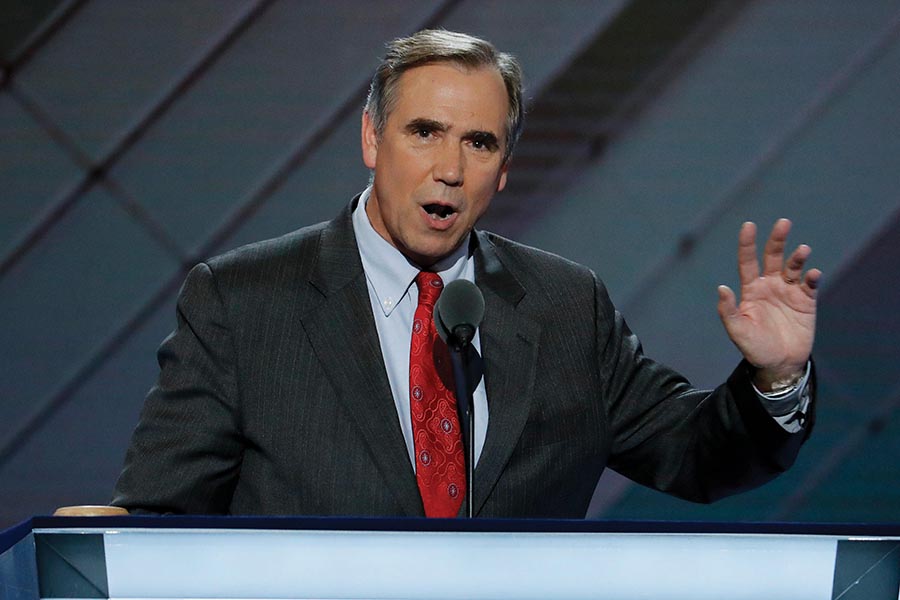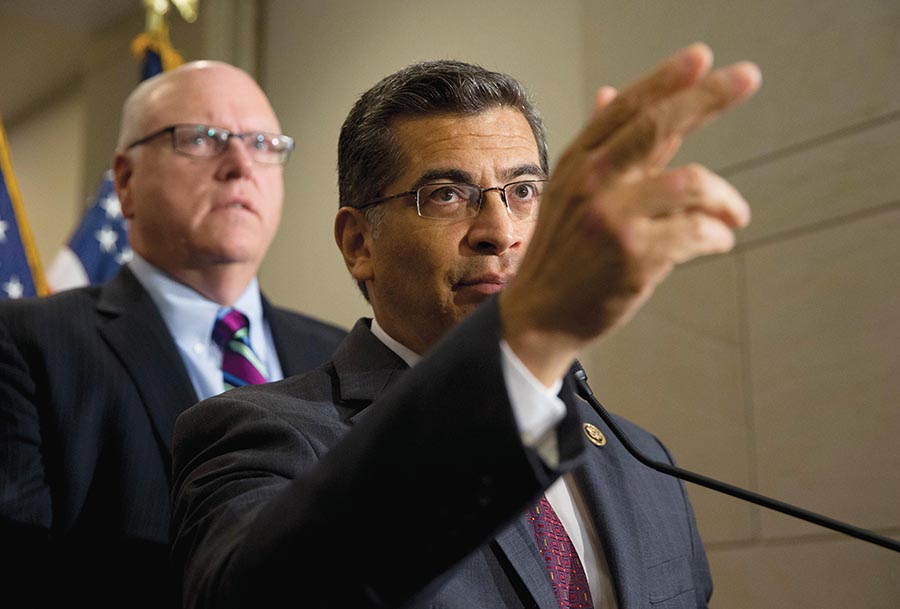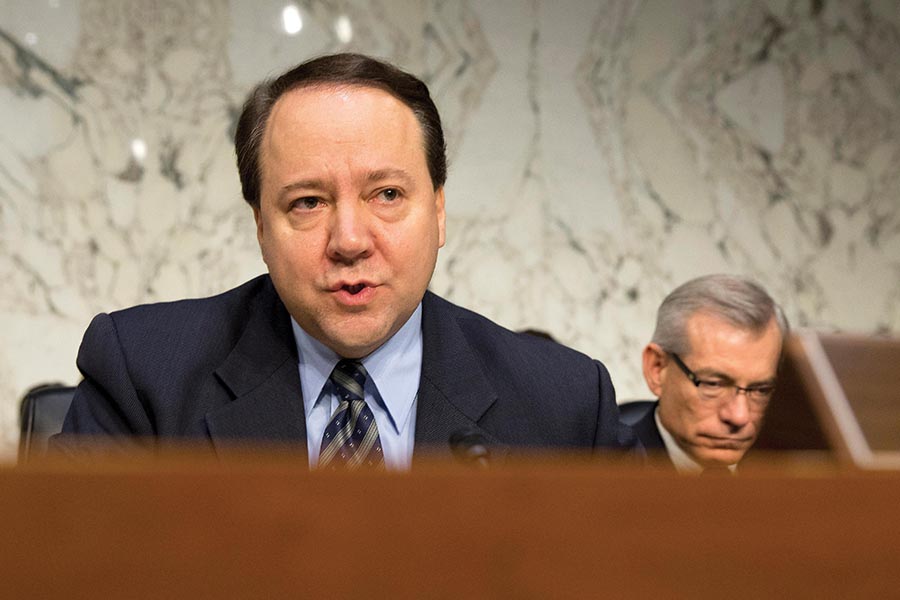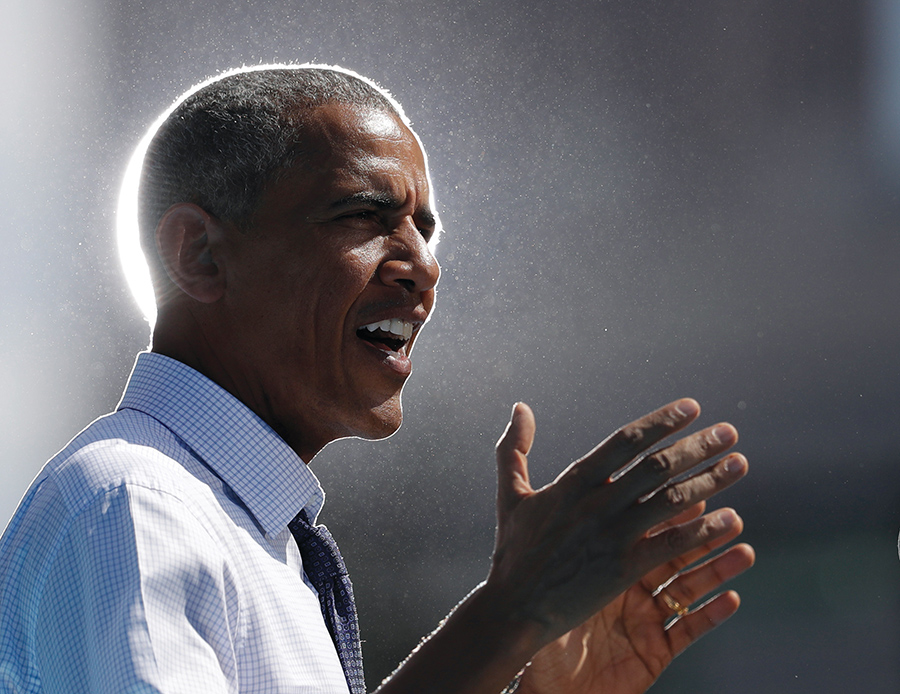If Obamacare is in crisis, the Left isn’t letting that crisis go to waste.
As insurers flee Obamacare marketplaces, Democrats and liberals are trying to revive a controversial solution they once had to abandon. That’s the creation of a “public option” government-run healthcare plan, which would compete against private insurance plans sold in the new state marketplaces set up under the Affordable Care Act.
While a public option is a political non-starter among Republicans, who want to scale back government involvement in healthcare, Democrats increasingly see it as their solution to the dwindling choices available in the marketplaces.
Five senators, backed by a coalition led by the Progressive Change Campaign Committee, introduced a resolution last week calling for a public option in every marketplace. The coalition has set up a website, WeWantAPublicOption.com, to make its case, pointing to polls showing that a majority of voters, including GOP voters, support the idea.
Sen. Jeff Merkley, who introduced the resolution, said a public option would build on successes in the healthcare law by improving marketplace competition and “holding insurance companies accountable.”

Sen. Jeff Merkley said a public option would build on successes in the healthcare law by improving marketplace competition and “holding insurance companies accountable.” (AP Photos)
He’s joined by Sens. Chuck Schumer, Bernie Sanders, Patty Murray and Dick Durbin, who say it’s the next logical step to expand health coverage now that Obamacare is in place. While the law extended coverage to 20 million people, another 29 million remain uninsured.
“We must continue to make needed healthcare reforms so that … people can have healthcare as a right, not a privilege,” Sanders said in a statement last week. “Insurance companies have shown they are more concerned with serving their shareholders than their customers. Every American deserves the choice of a public option in health insurance.”
Public option advocates say they want to build momentum after recent suggestions by Health and Human Services Secretary Sylvia Burwell, Obama adviser David Plouffe and even the president himself that it’s a way to fix problems in the marketplaces.
As Obamacare enrollees turned out to be sicker and more expensive than supporters predicted, insurers including Aetna, UnitedHealthCare and Humana are dramatically scaling back their offerings for the 2017 enrollment season that starts Nov. 1.
The result is marketplaces in which more consumers have fewer plans from which to choose. Nearly 36 percent of insurance rating areas will have just one insurer selling plans next year, up from just 4 percent in 2016, according to an analysis by Avalere. Nearly 55 percent of rating areas could have two or fewer insurers.
Backers hope a public option would force down the premiums charged by private insurers in order to remain competitive. They point to a 2013 estimate by the Congression Budget Office that instituting a public option would cause a $158 billion reduction in the deficit over a decade.

House Democratic Caucus Chairman Xavier Becerra said that “you cannot deny the public option is a way to save taxpayers money on healthcare.”
“I don’t care if you’re Republican or Democrat, you cannot deny the public option is a way to save taxpayers money on healthcare,” House Democratic Caucus Chairman Xavier Becerra told the Washington Examiner.
Liberals say they’ll keep pushing, especially if Hillary Clinton becomes president. She has long called for a public option, and while it’s unlikely Democrats will gain total control of Congress, she and Senate Democrats could put pressure on House Republicans next year to consider the idea.
Yet even ardent Democratic supporters of a public option admit it is politically unlikely in the anti-Obamacare era. Republicans, seeing some of their dire predictions about the healthcare law coming true, are unlikely to support fixes from the Left, especially one they see as a step toward a single-payer system, which would wipe out private insurers.
“It’s hard to believe Republicans trying to repeal the Affordable Care Act would be in any way supportive to the prospect of the public option,” Becerra said.
Rep. Pat Tiberi, chairman of the House Ways and Means health subcommittee, said creating a public option would just make things worse. He and other leading House Republicans instead propose phasing out big parts of the law and letting states change or entirely reject other provisions.
“I’m glad that some Democrats are acknowledging the problems with Obamacare,” Tiberi said. “However, it makes no sense that Democrats are doubling down on more government subsidized healthcare.”
Private health insurers aren’t pleased with the idea of a public option either. Clare Krusing, spokeswoman for America’s Health Insurance Plans, said a public option is “bound to fail,” pointing to the collapse over the past year of most of the government-funded insurance co-ops set up under the healthcare law.

“I’m glad that some Democrats are acknowledging the problems with Obamacare,” Rep. Pat Tiberi said.
“The public option is not a cure-all, and more importantly, the challenges facing the exchanges can’t be solved with a one-off fix,” Krusing said.
States can in fact create their own government health plan under a technical section of the healthcare law providing what’s known as “1332 waivers.” These waivers can give states more freedom from Obamacare’s requirements, up to and including introducing their own plan.
Scott Gottlieb, fellow at the conservative American Enterprise Institute, highlighted that possibility in an op-ed last week, in which he noted that Minnesota, Maine and Rhode Island are pursuing public option plans. He predicted more states would do so under a Clinton administration.
If many states offer their own plans, it would force out private insurers and ultimately produce a single-payer system, Gottlieb says.
“Introducing [the public option] across the country would move the U.S. much closer to the single-payer system progressives have always longed for,” he wrote.
Public option advocates agree it would bring down prices. To them, that’s a good thing. While subsidies are available to many marketplace customers, users complain of rising premiums and bigger deductibles that patients must pay before collecting benefits.
A public option plan would cut prices, partly by boosting competition in rural areas, said Topher Spiro, vice president for health policy at the Center for American Progress.
“I find it odd that conservatives who normally favor competition are so ideologically opposed to such a common-sense solution,” he said. “It’s not like private insurers are going to enter these markets. They never have.”

President Obama wrote that “Congress should revisit a public plan to compete alongside insurers in areas of the country where competition is limited.”
Lawmakers debated a public option in 2009 before passing the Affordable Care Act. Harry Reid was forced to abandon it in the final bill after then-Sen. Joe Lieberman opposed it.
But Reid still harbors hopes that it will come eventually, saying in 2013 that Americans must “work [their] way past” insurance-based healthcare toward a public option or single-payer system.
“What we’ve done with Obamacare is have a step in the right direction, but we’re far from having something that’s going to work forever,” he said on PBS’ “Nevada Week in Review.”
In the past two months, as insurers announced that they were abandoning the exchanges and hiking rates, Obamacare advocates have increasingly set their sights on a public option.
President Obama wrote in the Journal of the American Medical Association that “Congress should revisit a public plan to compete alongside insurers in areas of the country where competition is limited.”
Last month, bioethicist and former White House adviser Ezekiel Emanuel and Obama adviser David Plouffe both weighed in.
Emanuel wrote that the next administration should consider instituting a public option, which triggers when consumers don’t have enough choices. “Consumers should never be subject to the whims of insurer withdrawals or withdrawal threats,” he wrote in a Washington Post op-ed written with Spiro.
Plouffe said that once the election is over, it will be time to consider a public option.
“I think what will happen after this election, though, is obviously you’ll have the space to say, ‘OK, what is working well?'” Plouffe said on NBC’s “Meet the Press.” “And I think almost all of it is. What needs to be strengthened?”
Most recently, Burwell gave a nod to the public option, writing in a Sept. 9 CNN op-ed that a public option is among the tools Congress could use to improve competition.
“Congress could improve the affordability of marketplace coverage by increasing financial assistance, decreasing prescription drug costs and introducing a public option in places with limited competition,” she wrote.

